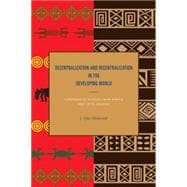
| List of Figures and Tables | p. vii |
| Acknowledgments | p. ix |
| List of Abbreviations | p. xiii |
| Decentralization and Recentralization in Developing Countries | p. 1 |
| Historical Trajectories in Subnational Autonomy | p. 17 |
| Subnational Revenue Autonomy | p. 62 |
| Subnational Expenditure Autonomy | p. 90 |
| Subnational Contractual Autonomy | p. 122 |
| Subnational Autonomy in Unitary States | p. 148 |
| When the Center Holds: Conclusions and Implications | p. 177 |
| Appendix: Interviewees (by Country) | p. 195 |
| References | p. 201 |
| Index | p. 215 |
| Table of Contents provided by Ingram. All Rights Reserved. |
The New copy of this book will include any supplemental materials advertised. Please check the title of the book to determine if it should include any access cards, study guides, lab manuals, CDs, etc.
The Used, Rental and eBook copies of this book are not guaranteed to include any supplemental materials. Typically, only the book itself is included. This is true even if the title states it includes any access cards, study guides, lab manuals, CDs, etc.